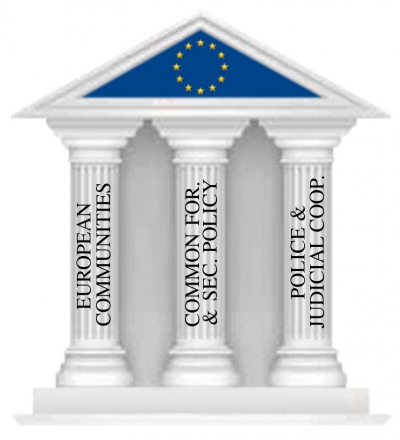Chlorofluorocarbons (CFCs) and hydrochlorofluorocarbons (HCFCs) are fully or partly halogenated hydrocarbons that contain carbon (C), hydrogen (H), chlorine (Cl), and fluorine (F), produced as volatile derivatives of methane, ethane, and propane. They are also commonly known by the DuPont brand name Freon.
The most common representative is dichlorodifluoromethane (R-12 or Freon-12). Many CFCs have been widely used as refrigerants, propellants (in aerosol applications), and solvents. Because CFCs contribute to ozone depletion in the upper atmosphere, the manufacture of such compounds has been phased out under the Montreal Protocol, and they are being replaced with other products such as hydrofluorocarbons (HFCs) including R-410A and R-134a.
The European Economic Community (EEC) was a regional organization that aimed to bring about economic integration among its member states. It was created by the Treaty of Rome of 1957. Upon the formation of the European Union in 1993, the EEC was incorporated into the EU and renamed the European Community (EC). In 2009, the EC formally ceased to exist and its institutions were directly absorbed by the EU. This made the Union the formal successor institution of the Community.
The Community's initial aim was to bring about economic integration, including a common market and customs union, among its six founding members: Belgium, France, Italy, Luxembourg, the Netherlands and West Germany. It gained a common set of institutions along with the European Coal and Steel Community (ECSC) and the European Atomic Energy Community (EURATOM) as one of the European Communities under the 1965 Merger Treaty (Treaty of Brussels). In 1993 a complete single market was achieved, known as the internal market, which allowed for the free movement of goods, capital, services, and people within the EEC. In 1994 the internal market was formalised by the EEA agreement. This agreement also extended the internal market to include most of the member states of the European Free Trade Association, forming the European Economic Area, which encompasses 15 countries.
Upon the entry into force of the Maastricht Treaty in 1993, the EEC was renamed the European Community to reflect that it covered a wider range than economic policy. This was also when the three European Communities, including the EC, were collectively made to constitute the first of the three pillars of the European Union, which the treaty also founded. The EC existed in this form until it was abolished by the 2009 Treaty of Lisbon, which incorporated the EC's institutions into the EU's wider framework and provided that the EU would "replace and succeed the European Community".
The EEC was also known as the European Common Market in the English-speaking countries and sometimes referred to as the European Community even before it was officially renamed as such in 1993.

1989Mar, 2
Twelve European Community nations agree to ban the production of all chlorofluorocarbons (CFCs) by the end of the century.
Choose Another Date
Events on 1989
- 15Apr
Tiananmen Square protests of 1989
Upon Hu Yaobang's death, the Tiananmen Square protests of 1989 begin in China. - 26Apr
Tiananmen Square protests of 1989
People's Daily publishes the April 26 Editorial which inflames the nascent Tiananmen Square protests - 27Apr
Tiananmen Square protests of 1989
The April 27 demonstrations, student-led protests responding to the April 26 Editorial, during the Tiananmen Square protests of 1989. - 20May
Tiananmen Square massacre
The Chinese authorities declare martial law in the face of pro-democracy demonstrations, setting the scene for the Tiananmen Square massacre. - 5Jun
Tiananmen Square protests of 1989
The Tank Man halts the progress of a column of advancing tanks for over half an hour after the Tiananmen Square protests of 1989.

 English
English  español
español  français
français  português
português  русский
русский  العربية
العربية  简体中文
简体中文 